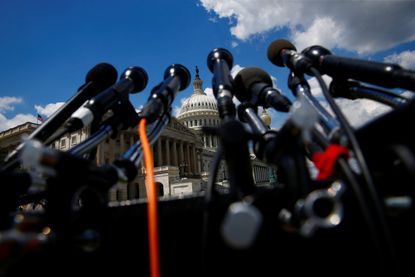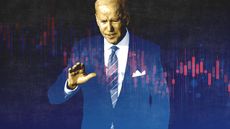The coming wave of media consolidation
The FCC just voted to repeal regulations that were put in place to ensure the public would hear a diversity of views. Here's what it all means.

The smartest insight and analysis, from all perspectives, rounded up from around the web:
"More media consolidation may be coming, thanks to President Trump's Federal Communications Commission," said Seth Fiegerman at CNN. The Republican-led agency last week voted 3-2 "along party lines" to repeal 40-year-old rules preventing a media company from owning a radio or TV station and a newspaper, or from owning multiple TV stations, in the same market. The regulations were put in place in the 1970s to ensure that the public would hear a diversity of views. But in the age of the internet, said Trump-installed FCC Chair Ajit Pai, such restrictions are outdated. To critics, the ruling seems "tailor-made to allow" the nation's biggest TV station owner, Sinclair Broadcast Group, to proceed with its plan to buy Tribune Media, another massive station owner, said Ted Johnson at Variety. Sinclair, which requires its stations to run conservative commentary on national topics, would own 223 TV stations nationwide — far more than any other broadcasting company — reaching roughly 72 percent of U.S. households. Sinclair chairman David Smith is friendly with President Trump, and Smith has been accused of using pro-Trump news coverage to "help grease the wheels" for the deal.
Jettisoning these "archaic rules" is a "good thing for consumers," said Steve Pociask at Forbes. Local TV stations are battling "the twin tornadoes of Facebook and Google" for ad dollars — and they're losing the fight, forcing them to cut back on reporters or even go off the air. Local newspapers, too, are in the throes of an advertising and revenue crisis. Allowing "modest media consolidation" would allow media owners to inject these enterprises with new funding and take advantage of economies of scale. "Clearly, consumers are better off keeping newspapers and broadcast stations open for business." Had the FCC made this decision in the 1980s or '90s, we'd be concerned, said The Kansas City Star in an editorial. But the digital era has "fundamentally changed" the media landscape. Consumers have countless news and entertainment options today on their TV, phone, or computer. "If you don't like what Sinclair says, turn the channel." Or better yet, go online, where "anyone with a camera and computer will be able to provide local news that can compete with the other stations" in your market.
Subscribe to The Week
Escape your echo chamber. Get the facts behind the news, plus analysis from multiple perspectives.

Sign up for The Week's Free Newsletters
From our morning news briefing to a weekly Good News Newsletter, get the best of The Week delivered directly to your inbox.
From our morning news briefing to a weekly Good News Newsletter, get the best of The Week delivered directly to your inbox.
Hardly, said Klint Finley at Wired. Most Americans still rely on local TV for news about "local politics, government, or crime." A 2015 Pew study of consumers in Denver; Macon, Georgia; and Sioux City, Iowa, found that "fewer than 10 percent of respondents often get local news from digital-only outlets." Who owns these broadcasts matters. Local TV news "remains a potent force for shaping public opinion, particularly on electoral matters," said Gigi Sohn at The Verge. The FCC's changes will have most impact on small- and medium-size markets — such as Fort Wayne, Indiana, and Augusta, Georgia — where there may be just two or three broadcasters left, or one company able to dominate TV, radio, and print. "The result will be less local coverage and less viewpoint diversity, which makes for a less informed citizenry."
Sign up for Today's Best Articles in your inbox
A free daily email with the biggest news stories of the day – and the best features from TheWeek.com
-
 Magazine solutions - November 29, 2024
Magazine solutions - November 29, 2024Puzzles and Quizzes Issue - November 29, 2024
By The Week US Published
-
 Magazine printables - November 29, 2024
Magazine printables - November 29, 2024Puzzles and Quizzes Issue - November 29, 2024
By The Week US Published
-
 What are Trump's plans for public health?
What are Trump's plans for public health?Today's Big Question From abortion access to vaccine mandates
By Devika Rao, The Week US Published
-
 The pros and cons of noncompete agreements
The pros and cons of noncompete agreementsThe Explainer The FTC wants to ban companies from binding their employees with noncompete agreements. Who would this benefit, and who would it hurt?
By Peter Weber Published
-
 What experts are saying about the economy's surprise contraction
What experts are saying about the economy's surprise contractionThe Explainer The sharpest opinions on the debate from around the web
By Brendan Morrow Published
-
 The death of cities was greatly exaggerated
The death of cities was greatly exaggeratedThe Explainer Why the pandemic predictions about urban flight were wrong
By David Faris Published
-
 The housing crisis is here
The housing crisis is hereThe Explainer As the pandemic takes its toll, renters face eviction even as buyers are bidding higher
By The Week Staff Published
-
 How to be an ally to marginalized coworkers
How to be an ally to marginalized coworkersThe Explainer Show up for your colleagues by showing that you see them and their struggles
By Tonya Russell Published
-
 What the stock market knows
What the stock market knowsThe Explainer Publicly traded companies are going to wallop small businesses
By Noah Millman Published
-
 Can the government save small businesses?
Can the government save small businesses?The Explainer Many are fighting for a fair share of the coronavirus rescue package
By The Week Staff Published
-
 How the oil crash could turn into a much bigger economic shock
How the oil crash could turn into a much bigger economic shockThe Explainer This could be a huge problem for the entire economy
By Jeff Spross Published